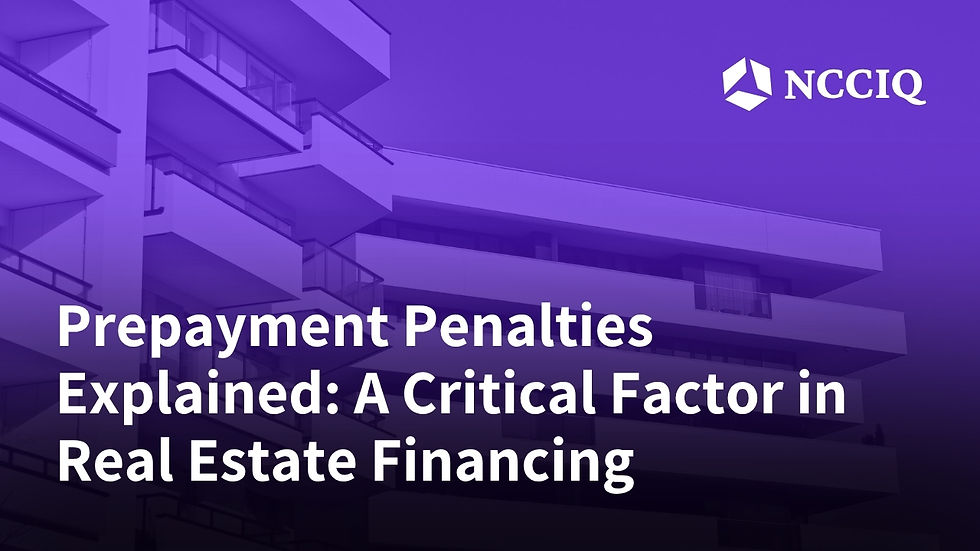Prepayment Penalties Explained: A Critical Factor in Real Estate Financing
- NCC IQ

- Jun 2
- 5 min read
Updated: Jul 30
In the world of real estate investing, the term "prepayment penalty" refers to a fee that a lender may impose on a borrower if the borrower pays off the loan, or a significant portion of it, ahead of the agreed-upon schedule. For investors, this is an essential aspect of real estate financing to understand, as it can have substantial implications on cash flow, investment returns, and refinancing strategies.
What is a Prepayment Penalty?
A prepayment penalty is a contractual clause written into certain mortgage agreements. It serves as a financial deterrent to borrowers who attempt to pay off their loan before a specified period. Lenders apply these penalties as a way to recoup some of the interest income they would have otherwise earned if the borrower continued making regular payments over the full term of the loan.

For example, if an investor takes out a 30-year mortgage but decides to sell the property or refinance after five years, the lender may impose a prepayment penalty for paying off the loan ahead of schedule. This penalty can range from a flat fee to a percentage of the outstanding balance.
Prepayment penalties are common in certain types of loans, such as subprime mortgages, jumbo loans, or commercial real estate loans. They can also appear in loans where the borrower has secured a lower-than-average interest rate. For investors, understanding the presence and terms of any prepayment penalty is critical before signing a loan agreement, as it can affect the profitability of future actions such as refinancing or selling the property.
Types of Prepayment Penalties
There are two main types of prepayment penalties that investors should be aware of: hard prepayment penalties and soft prepayment penalties.
Hard Prepayment Penalty: This type of penalty applies if the borrower pays off the loan early, whether by refinancing or selling the property. Hard prepayment penalties tend to be more restrictive and are often found in non-owner-occupied mortgages or commercial real estate loans.
Soft Prepayment Penalty: This type of penalty typically only applies if the borrower refinances the loan within a specific time frame. If the borrower sells the property, the penalty may not apply. Soft prepayment penalties are more common in owner-occupied residential properties.
Prepayment penalties are also sometimes structured as a declining prepayment penalty, where the penalty decreases over time. For instance, the penalty might be 3% of the outstanding loan balance if the loan is paid off in the first year, 2% in the second year, and 1% in the third year, after which no penalty applies.
Why Do Prepayment Penalties Exist?
Lenders incorporate prepayment penalties to safeguard their financial interests. Mortgages are structured with the expectation that the lender will receive regular interest payments over the loan term. When borrowers prepay a loan, the lender loses out on these future interest payments. Prepayment penalties help to offset this lost income.
From the lender's perspective, the risk of early repayment is significant. Borrowers often prepay or refinance when interest rates drop or when the value of the property has increased, which can enable a borrower to secure better financing terms. To mitigate this risk, lenders impose prepayment penalties to ensure that the initial financial arrangements are not disrupted by the borrower’s changing circumstances.
For borrowers, these penalties can be a potential drawback, especially if there are plans to sell or refinance the property within the early years of the loan term. Investors should weigh the benefits of a lower interest rate loan, which may come with a prepayment penalty, against the potential costs if they decide to exit the loan early.
Impact on Real Estate Investors
Prepayment penalties can have a profound impact on real estate investors, particularly those who prioritize flexibility in their financing strategy. Investors need to evaluate how these penalties might affect their ability to reposition assets, refinance loans, or sell properties as part of their broader investment strategy.
Cash Flow Considerations: Prepayment penalties can directly affect an investor's cash flow by introducing unexpected costs if the investor seeks to exit the loan prematurely. For example, if an investor has plans to refinance a property after its value appreciates, they may face a significant penalty that eats into their refinancing benefits. This could reduce the investor's available capital for reinvestment or limit their ability to lock in better interest rates.
Refinancing Limitations: Many investors use refinancing as a strategy to free up equity in a property. However, prepayment penalties can make refinancing less attractive by reducing the overall financial benefit. This could limit an investor's ability to take advantage of favorable interest rate environments or to adjust their leverage as market conditions change.
Sale of Property: Investors planning to sell a property before the prepayment penalty period ends must account for the additional cost of the penalty when calculating their expected return on investment. In some cases, the penalty might be significant enough to impact the overall profitability of the deal.
Commercial Real Estate Implications: In commercial real estate, prepayment penalties can be particularly steep, reflecting the large loan amounts and the lender's desire to protect their long-term interest income. Investors in commercial real estate must carefully assess whether the potential benefits of early payoff outweigh the costs associated with the penalty.
For real estate investors, understanding prepayment penalties is essential for optimizing financing strategies and maximizing returns. While these penalties are designed to protect lenders, they can significantly impact an investor's ability to manage their properties and portfolios efficiently.
By thoroughly analyzing loan terms, considering alternative financing options, and negotiating favorable prepayment penalty structures, investors can minimize the potential downsides and better position themselves for financial success.
No Offer or Solicitation
This communication is intended solely for informational and educational purposes. It does not constitute, and shall not be construed as, an offer, invitation, or solicitation to purchase, acquire, subscribe for, sell, or otherwise dispose of any real estate investments, securities, or related financial instruments. Nothing contained herein should be interpreted as a recommendation or endorsement of any specific investment strategy or opportunity. Furthermore, this communication does not represent, and shall not be deemed to constitute, the issuance, sale, or transfer of any real estate interests in any jurisdiction where such actions would be in violation of applicable laws, regulations, or licensing requirements.
About NCC IQ
NCC IQ is the official real estate eLearning platform of Northstar Capital & Co. (NCC), developed to support the ongoing education and advancement of industry professionals. The platform offers a robust mix of premium and complimentary resources—including on-demand videos, live virtual events, industry podcasts, eBooks, and expert-authored articles—designed to deliver actionable insights and practical tools. Stay informed by following us on LinkedIn and Instagram for the latest educational content and market updates.


















Comments